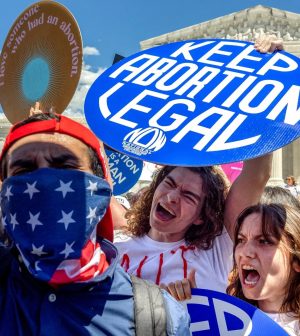- Finding Unshakable Power in a World That Wants to Pull Us ApartPosted 5 months ago
- What could a Donald Trump presidency mean for abortion rights?Posted 5 months ago
- Financial Empowerment: The Game-Changer for Women in Relationships and BeyondPosted 7 months ago
- Mental Health and Wellbeing Tips During and After PregnancyPosted 7 months ago
- Fall Renewal: Step outside your Comfort Zone & Experience Vibrant ChangePosted 7 months ago
- Women Entrepreneurs Need Support SystemsPosted 7 months ago
What could a Donald Trump presidency mean for abortion rights?

By Anastasia Moloney | Context
Published: November 08, 2024
What’s the context?
Abortion rights groups fear a second Trump administration will further restrict access to abortion care and pills
Reproductive rights groups fear a second Donald Trump administration will step up efforts to curb abortion pills and even push for a nationwide abortion ban.
The Trump administration will “decimate” reproductive freedoms that face “unprecedented threats”, according to the Guttmacher Institute, a reproductive rights research group.
What is Trump’s stance on abortion?
Trump has stated he believes the issue of abortion should be determined by individual U.S. states, not the federal government.
During his first term as U.S. president from 2017 to 2021, Trump appointed three conservative justices to the Supreme Court, creating a 6-3 conservative majority that overturned the 1973 Roe v. Wade decision that made abortion a constitutional right.
The 2022 reversal of Roe v. Wade allowed individual states to decide on whether to ban abortion.
Since the court decision, Republican-dominated legislatures have banned or severely limited abortion in nearly two dozen states, leaving millions of women, especially in the south, without access to the procedure in their own state. Trump has pushed back on claims he would support a national abortion ban. During a September televised debate with Democrat candidate Kamala Harris, Trump said: “I’m not signing a ban and there’s no reason to sign a ban.”
Trump has pushed back on claims he would support a national abortion ban. During a September televised debate with Democrat candidate Kamala Harris, Trump said: “I’m not signing a ban and there’s no reason to sign a ban.”
However, at 10 state-level ballots held alongside the Nov. 5 presidential election, seven states, including some won by Trump, approved measures to restore or protect abortion rights.
What about abortion pills?
Backed by a Republican majority in the Senate, the Trump administration could build on efforts already made to restrict access to abortion pills, such as mifepristone.
In the United States, more than half of all abortions are carried out with abortion pills rather than by surgical procedure, according to the Guttmacher Institute.
Nancy Northup, head of the Center for Reproductive Rights, said a Trump presidency would compound harms already done to restrict abortion access “with new, potentially far worse ones”.
“It will seek to stop the availability of medication abortion by mail, which has been a lifeline in post-Roe America,” Northup said after Trump’s win was announced.
In the past two years, conservative lawmakers in some states have already made it harder for women and girls to get the pills. They have banned use of the pills, banned them being mailed, or banned doctors prescribing them through phone or video consultations.
The Trump administration could also attempt to rescind the Food And Drug Administration’s approval of abortion drugs by appointing anti-abortion officials to the body and other government health agencies.
“Trump appointees will likely push to reinstate medically unnecessary requirements that would, among other things, eliminate access to mifepristone via telehealth,” the Guttmacher Institute said.
How else can abortion access be limited?
A Trump administration could weaken a 1986 federal law called the Emergency Medical Treatment and Labor Act that ensures Medicare-participating hospitals offer emergency abortion access care regardless of a patient’s ability to pay.
Another way would be to cut off funding to Planned Parenthood, a reproductive health organisation.
Planned Parenthood receives Medicaid funding, and in some clinics it offers abortions and provides contraception, as well as cancer and other health screenings.
“The Trump-Vance administration would likely encourage states to “defund” Planned Parenthood by making Planned Parenthood affiliates ineligible to receive reimbursement from Medicaid and other publicly funded family planning programs,” the Guttmacher Institute said.
Context is powered by the Thomson Reuters Foundation Newsroom.
Our Standards: Thomson Reuters Trust Principles
(Feature Image: Anti-abortion and abortion rights protestors demonstrate on the anniversary of the decision by the United States Supreme to overturn Roe v. Wade, outside the U.S. Supreme Court, in Washington, U.S., June 24, 2024. REUTERS/Evelyn Hockstein)






